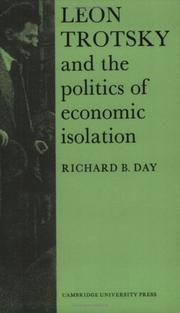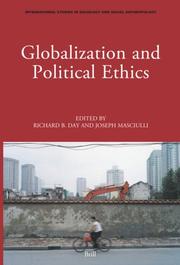| Listing 1 - 10 of 17 | << page >> |
Sort by
|

ISBN: 052120089X 0521524369 0511524021 0511864485 Year: 1973 Publisher: Cambridge : Cambridge University Press,
Abstract | Keywords | Export | Availability | Bookmark
 Loading...
Loading...Choose an application
- Reference Manager
- EndNote
- RefWorks (Direct export to RefWorks)
A highly original and controversial examination of events in Soviet Russia from 1917 to 1927 in which Professor Day challenges both the standard Trotskyite and Stalinist interpretations of the period. At the same time he rejects the traditional emphasis on Trotsky's concept of Permanent Revolution and argues that a Marxist theorist is essential. Professor Day concentrates upon the economic implications of revolutionary Russia's isolation from Europe. How to build socialism - in a backward, war-ravaged society, without aid from the West: this problem lay behind many of the most important political conflicts of Soviet Russia's formative years.
Communism --- Communisme --- Trotsky, Leon, --- Soviet Union --- URSS --- Economic policy --- Politique économique --- economische Isolatie --- Politique économique --- economische isolatie --- Arts and Humanities --- History --- Bolshevism --- A. Kros, --- Bronshteĭn, Lev Davidovich, --- Bronstein, Léon, --- Bronstejn, Lev Davidovich, --- Crux, --- L.D.T., --- Tʻo-lo-ssu-chi, --- Tʻo-lo-tzʻu-chi, --- Torokkī, --- Torotsukī, --- Torotsukii, --- Troc̦ki, --- Trocki, Lev, --- Trockij, Lev, --- Trocký, Leon, --- Troţki, Lev, --- Trotski, Leo, --- Trótski, Leon, --- Trôtski, Lêông, --- Trot︠s︡kiĭ, L. D. --- Trot︠s︡kiĭ, Lev, --- Trotskiĭ, N., --- Trotsky, L. D., --- Trotsky, Leone, --- Trotsky, Lev Davidovitch, --- Trotzki, Lee, --- Trotzkij, Leo, --- Trotzky, Leon, --- Trotzky, N., --- Троцкий, Лев, --- טראצקי, ל., --- טראָצקי, לעאָן, --- טראצקי, לעוו, --- טראָצקי, ליאון, --- טרוצקי, ל., --- טרוצקי, לב, --- تروتسكى، لئون,
Book
Year: 1990 Publisher: Armonk (N.Y.) : Sharpe,
Abstract | Keywords | Export | Availability | Bookmark
 Loading...
Loading...Choose an application
- Reference Manager
- EndNote
- RefWorks (Direct export to RefWorks)
Book
Year: 1973 Publisher: London Cambridge university press
Abstract | Keywords | Export | Availability | Bookmark
 Loading...
Loading...Choose an application
- Reference Manager
- EndNote
- RefWorks (Direct export to RefWorks)

ISBN: 1563246600 Year: 1995 Publisher: Armonk Sharpe
Abstract | Keywords | Export | Availability | Bookmark
 Loading...
Loading...Choose an application
- Reference Manager
- EndNote
- RefWorks (Direct export to RefWorks)
Cold War --- Economic history --- Soviet Union --- Economic policy.
Book
Year: 1973 Publisher: London Cambridge University Press
Abstract | Keywords | Export | Availability | Bookmark
 Loading...
Loading...Choose an application
- Reference Manager
- EndNote
- RefWorks (Direct export to RefWorks)

ISBN: 9780511524028 9780521200899 9780521524360 Year: 1973 Publisher: Cambridge Cambridge University Press
Abstract | Keywords | Export | Availability | Bookmark
 Loading...
Loading...Choose an application
- Reference Manager
- EndNote
- RefWorks (Direct export to RefWorks)

ISBN: 1281458155 9786611458157 9047411757 9789047411758 9789004155817 9004155813 9781281458155 6611458158 Year: 2007 Publisher: Leiden Boston Brill
Abstract | Keywords | Export | Availability | Bookmark
 Loading...
Loading...Choose an application
- Reference Manager
- EndNote
- RefWorks (Direct export to RefWorks)
Rational exercise of our responsibility requires us to relate the globalization process to the ends and purposes that properly befit human life and human community. Economic 'ends' are merely the 'means' to ends of a higher order, which can only be specified in terms of moral duty and ethical purpose. The contributors to this book explore political-ethical issues of globalization, including terrorism, institutional change and distribution in the world economy, the role of the United Nations and international financial institutions, the regimes of international trade and technology transfer, the effects of regionalism in the European Union and the Association of Southeast Asian Nations, the failure of Russia, human rights enforcement in Africa, and the prospects for global governance. This book was originally published as Volume 4 numbers 3-4 (2005) of Brill's journal Perspectives on Global Development and Technology .
Internationalisatie. --- Politieke ethiek. --- Globalization --- Political ethics. --- Globalización --- Ética política. --- Ethics, Political --- Ethics in government --- Government ethics --- Political science --- Politics, Practical --- Ethics --- Civics --- Economic aspects. --- Moral and ethical aspects. --- Aspectos económicos. --- Aspectos morales y éticos. --- Moral and ethical aspects
Book
ISBN: 1282399160 9786612399169 9047441931 9789047441939 9781282399167 9004167706 9789004167704 9781608460892 Year: 2009 Publisher: Leiden Boston
Abstract | Keywords | Export | Availability | Bookmark
 Loading...
Loading...Choose an application
- Reference Manager
- EndNote
- RefWorks (Direct export to RefWorks)
The theory of Permanent Revolution has been associated with Leon Trotsky for more than a century since the first Russian Revolution in 1905. Trotsky was the most brilliant proponent of Permanent Revolution but by no means its sole author. The documents in this volume, most of them translated into English for the first time, demonstrate that Trotsky was one of several participants in a debate from 1903-7 that involved numerous leading figures of Russian and European Marxism, including Karl Kautsky, Rosa Luxemburg, Franz Mehring, Parvus and David Ryazanov. This volume reassembles that debate, assesses it with reference to Marx and Engels, and provides new evidence for interpreting the formative years of Russian revolutionary Marxism.
Permanent revolution theory. --- Communism --- Revolutions --- Revolutions and socialism --- Socialism --- Trotsky, Leon, --- Bronshteĭn, Lev Davidovich, --- Trotski, Leo, --- Trot︠s︡kiĭ, Lev, --- Trotzki, Lee, --- Trotzky, Leon, --- Trotzky, N., --- Trotzkij, Leo, --- Trockij, Lev, --- Trocký, Leon, --- Trotsky, L. D., --- Troc̦ki, --- Tʻo-lo-ssu-chi, --- Trotskiĭ, N., --- Trotsky, Lev Davidovitch, --- Tʻo-lo-tzʻu-chi, --- Trótski, Leon, --- Bronstein, Léon, --- Trot︠s︡kiĭ, L. D. --- Trocki, Lev, --- Troţki, Lev, --- Trôtski, Lêông, --- Torotsukī, --- Torokkī, --- Torotsukii, --- Троцкий, Лев, --- טראָצקי, ליאון, --- טראָצקי, לעאָן, --- טראָצקי, לעװ --- טראצקי, לעאן --- טראצקי, לעוו --- טראצקי, לעוו, --- טראצקי, ל. --- טרוצקי, לב, --- טרוצקי, ל. --- טרוצקי, ל., --- تروتسكى، لئون --- Crux, --- A. Kros, --- L.D.T., --- Bronstejn, Lev Davidovich, --- Trotsky, Leone, --- Троцкий, Лев, --- טראצקי, ל., --- تروتسكى، لئون,
Book
ISBN: 9004352198 Year: 2018 Publisher: Leiden, Netherlands ; Boston, [Massachusetts] : Brill,
Abstract | Keywords | Export | Availability | Bookmark
 Loading...
Loading...Choose an application
- Reference Manager
- EndNote
- RefWorks (Direct export to RefWorks)
Responses to Marx's Capital : From Rudolf Hilferding to Isaak Illich Rubin is a collection of primary sources dealing with the reception of the economic works of Karl Marx from the First to the Third International. The documents, translated for the first time from German and Russian, range from the original reviews of the three volumes of Capital and the three volumes of Theories of Surplus Value to the debates between the Marxist economists and the bourgeois academic representatives of the theory of marginal utility and the German historical school. The volume closes with six essays by the prominent economist Isaak I. Rubin, including ‘Essays on Marx's Theory of Money’ and ‘The Dialectical Development of Categories in Marx’s Economic System’.
Book
ISBN: 1283356678 9786613356673 9004210822 9789004210820 9789004201569 9004201564 Year: 2012 Publisher: Leiden Boston
Abstract | Keywords | Export | Availability | Bookmark
 Loading...
Loading...Choose an application
- Reference Manager
- EndNote
- RefWorks (Direct export to RefWorks)
The theory of imperialism is usually associated with some of the ‘big names’ in the history of European Marxism, such as Lenin, Rosa Luxemburg, Rudolf Hilferding and Nikolai Bukharin, alongside whom the English Progressive John Hobson is usually mentioned. However, little is known about the development of Marxist theory on this subject besides the books of these figures. This volume assembles for the first time the main documents of the international debate on imperialism that took place in the Second International during the period 1898–1916. It assesses the contributions of the individual participants to the developing theory of imperialism, placing them in the context of contemporary political debates.
Imperialism --- History --- Philosophy
| Listing 1 - 10 of 17 | << page >> |
Sort by
|

 Search
Search Feedback
Feedback About UniCat
About UniCat  Help
Help News
News